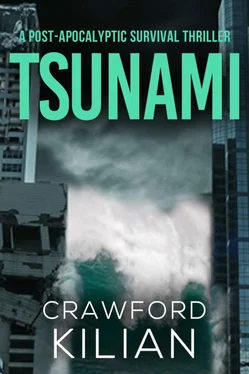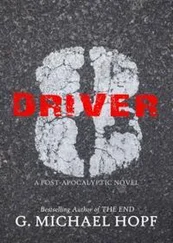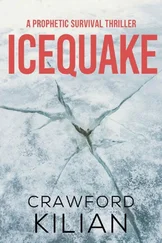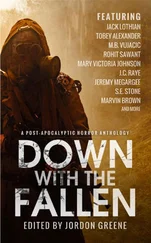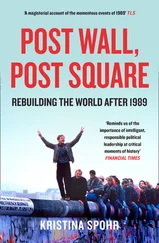The drive through Carmel and into Monterey took a long time. Muddy water rose above clogged culverts and swept across the road in many places; here and there the asphalt was gone completely. Another year, and horses would be more useful than trucks even if the gas held out.
— Gas. He kept thinking about the Sitka Carrier , just a few miles away with enough gas and diesel fuel to keep them going for years. Somehow it had to be salvaged, whatever the cost —
The stink of oil-soaked beaches was heavy in Monterey and mixed with the smell of smoke. The debris left by the waves always smoldered a bit, but now fires were burning all over the undamaged parts of town. The streets were empty in the rain. In the civic centre, a squad of soldiers in ponchos flagged him down. In the blue light of dawn they looked cold and sleepy.
“Morning, Mr. Allison,” said the buck sergeant in charge. “The lieutenant’s operating outa the library.” He pointed down the street to a glass-and-brick building on the corner, near the edge of the wreckage area.
Allison parked and went inside. Three or four Coleman lanterns made pools of light on the main floor. At a desk beneath one lantern sat Mercer, drinking coffee and eating a sandwich. He waved a dispassionate greeting as Allison came in. Across the floor, a dozen soldiers were smoking dope and playing cards.
“Want a sandwich?”
“No. It’s all gone okay?”
“It was a fucking picnic. People here were so glad to see us, they wet their pants. Told us where the guys were, how many, all that.”
“You’re a genius. A genius. How much do we control?”
“Up into Seaside, I guess.”
“The Leadership Committee wants to take over Ord.”
“That makes sense. Sure. Take a day or two.”
“Then we stop.”
“I don’t know about that. Might still be an idea to take over the whole Martial Law Zone.”
“The whole MLZ. Wow. Can we handle that?”
“Man, we can handle anything if we got enough gas.”
“All right . And maybe I can get you the gas.” He sketched out his salvage plan. Mercer ate.
“Might work,” he said at last. “Need some professionals. What do we do if it doesn’t work out?”
“Damned if I know. I keep hearing that San Francisco’s got no gas, the San Joaquin Valley’s got no gas. If we can’t salvage the tanker, we’ll have to start cooking alcohol.” Mercer smiled. “Man, come on. I’m talkin’ transportation for hundreds of trucks, not some funky way to get you up and down the creek.”
“Then let’s get at the Sitka Carrier.”
“Okay. Come on,” Mercer said, standing up.
“What?”
“Time for the big recruiting speech.”
They went back outside. Across the street was a broad, sloping lawn below the fire station. Soldiers, bareheaded and unarmed, were filling the lawn; behind them came Mercer’s men, rifles levelled. Allison estimated over five hundred mutineers must be in the group. They looked tired and scared; most were kids, trainees. But a few were older men, senior NCOs and a few officers.
Mercer and Allison crossed the street and walked up the driveway to the fire station’s main entrance. It was brighter now, under a low overcast that streamed by from the west. Civilians, scores of them, were gathering in front of the library and on the nearby city hall lawn.
“Long as you’re here,” said Mercer, “you might as well be the emcee.” He nodded towards a microphone standing by the fire-station entrance.
“For what?”
“We’re executing twenty dudes caught raping or robbing civilians, or firing on our men. They’re like a warning that we mean business and we’re righteous. Anybody co-operates, they’ll be okay. They don’t, they get shot.”
“Jesus, Odell, you really get me into some of the—”
“Do it. We got a million more things to do today besides this.”
The battery-powered speakers crackled and squealed while Allison introduced himself. He began diffidently, but gained confidence and spoke with growing fervour about the hardships everyone had faced, about the need for soldiers and civilians to stand together. After a few minutes, people began to applaud. At the end, the applause was long and loud.
It swelled even more as the twenty men were marched out. Their hands were tied behind them; gags were stuffed in their mouths. Many were bruised and blood-streaked. Each was escorted by two soldiers, who gripped him by the elbows. One, a young man with a captain’s bars on the collar of his fatigue shirt, tried to break free; a blow to the head from a pistol butt quieted him.
Five young soldiers carrying M-16s came around the corner, marching in step. They wore glossy chromed helmets and bright-blue neck scarves; mirrored sunglasses masked their eyes. The crowd quieted almost in a breath, except for the squallings of babies.
At a sergeant’s command the five soldiers lined up at parade rest, facing a patch of grass just a few feet from the microphone where Allison stood.
The first five prisoners were thrown onto their bellies on the wet, dead grass. The firing squad raised their rifles. Allison looked up, at the crowds on the lawns and the street and in the windows of the buildings. This was the civic centre of a small California city. Until a few months ago, no one here could have imagined such a scene. He wondered if the others saw it with the same dreamlike lucidity and sharpness.
“Fire!” snapped the sergeant. Allison’s ears rang, and he remembered the woman he’d shot. The prisoners bounced and twitched under the impact of the bullets. Their escorts dragged away the bodies to make room for the next five. Allison made himself watch, and when one of the prisoners looked up and met his gaze, Allison did not look away. So what if the son-of-a-bitch was a living, thinking human being; that was why he’d been a problem. An instant later the prisoner’s face was concealed in the red-soaked grass.
The civilians cheered as the last bodies were hauled away. Allison relaxed. This was what the great leaders of the past had known, this power of life and death. No other power compared with it.
Allison did not get back to Escondido Creek for many days. The Monterey area was crawling with deserters. Women were raped and murdered, men shot dead before their children, houses burned, food stocks destroyed.
Mercer force-marched his men at night, across the muddy fields where artichokes had once grown. In predawn rain they emerged out of darkness, slipping silently into towns while the deserters slept. Not many shots were fired except in the executions.
Allison went with them, sharing the wet and tiredness. When a town or village was secured, he went in and presided over the executions. Then he met with the local people and appointed a government; by nightfall he was off again.
He had been so long at the ranch that the world beyond Monterey looked foreign. Roads were breaking up; farmlands had turned into weedy bogs. Whole neighbourhoods in Watsonville and Salinas had burned down. Mold spread across sodden carpeting in empty offices. Dogs had learned to hunt at night, in packs of fifteen and twenty; Allison often heard them bay in the dark, but they never challenged the soldiers. Rats were everywhere.
So were people. It seemed as if every building in the MLZ, intact or not, was jammed with people. Some were refugees from the coast, others from the towns and cities to the north — Santa Cruz, Los Gatos, San Jose — where food was scarce and gangs fought each other in the streets.
First out of curiosity, then out of necessity, Allison interrogated many of the refugees. The local councils in the Bay Area, he learned, had survived the attempted military takeover, but were desperately short of food and fuel. They were planning to salvage the Sitka Carrier .
Читать дальше
